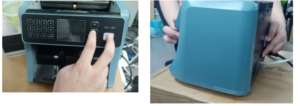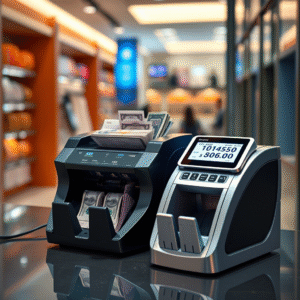Electronic money counters are transforming various industries by automating cash handling processes. These machines offer increased accuracy, efficiency, and security, benefiting businesses ranging from retail and banking to casinos and even cryptocurrency operations. This article explores the diverse applications, benefits, and key features of electronic money counters, providing insights into how they streamline operations and improve financial management.
The Unsung Hero of Retail & Hospitality: Electronic Money Counters
Imagine running a bustling cafe. The lunchtime rush is over, and you’re staring at a mountain of bills and coins. Counting it all by hand? That’s time you could be spending on inventory, staff training, or even just relaxing for a minute. That’s where an electronic money counter comes in.
These machines aren’t just for banks anymore. Retail stores, restaurants, bars – basically, any business that deals with a lot of cash can benefit. They drastically reduce the time it takes to count money, minimize errors (human error is a real thing!), and free up staff to focus on more important tasks.
Think about it: a cashier spends less time counting, meaning shorter lines and happier customers. A manager spends less time verifying the day’s earnings, meaning more time for strategic planning. It’s a win-win.
Plus, many modern money counters can detect counterfeit bills. This is a huge advantage, as it protects businesses from financial losses and potential legal issues. According to a 2023 report by the U.S. Currency Education Program, counterfeit currency is a persistent problem, with an estimated $147 million in counterfeit bills circulating globally. Having a reliable money counter can significantly mitigate this risk.
Here’s a simple breakdown of the benefits for retail & hospitality:
- Speed: Counts hundreds of bills per minute.
- Précision: Eliminates human error.
- Détection de contrefaçon : Protects against fraud.
- Efficiency: Frees up staff time.
- Improved Reconciliation: Easier to balance daily accounts.
Banking & Finance: Accuracy is Non-Negotiable
For banks and other financial institutions, accuracy isn’t just a nice-to-have; it’s essential. Electronic money counters are the backbone of their cash handling operations. They ensure that deposits are counted correctly, withdrawals are processed accurately, and the bank’s overall financial records are impeccable.
These machines often come with advanced features like batch counting (separating bills into specific denominations) and serial number tracking (recording the serial numbers of each bill for auditing purposes). This level of detail is crucial for maintaining compliance with regulations and preventing fraud.
The Federal Reserve System handles billions of dollars daily. According to the Federal Reserve, in 2022, approximately 49.3 billion banknotes were in circulation, valued at over $2.28 trillion. Efficient and accurate money counting is paramount to managing such vast sums. Electronic money counters help banks manage these volumes efficiently.
Furthermore, the use of electronic money counters contributes to a more secure environment. By automating the counting process, banks reduce the risk of internal theft and minimize the potential for errors that could lead to financial discrepancies.
Consider this table illustrating the impact of electronic money counters on bank efficiency:
| Metric | Without Money Counter | With Money Counter | Improvement |
|---|---|---|---|
| Time to Count $10,000 | 60 minutes | 5 minutes | 92% |
| Taux d'erreur | 0.5% | 0.01% | 98% |
| Staff Hours Saved (per day) | 0 | 4 | N/A |
Beyond the Expected: Casinos, Vending, & Even Crypto?
You might think of casinos as the obvious place for money counters, and you’d be right. But their use extends far beyond the gaming tables. Casinos need to accurately count and verify massive amounts of cash from various sources, including slot machines, table games, and cashier cages.
Electronic money counters are essential for ensuring that the casino’s financial operations are transparent and compliant with gaming regulations. They help prevent fraud, detect counterfeit bills, and maintain accurate records of all cash transactions.
But what about vending machines? Think about those large vending operations managing hundreds of machines. Collecting and counting the cash from each machine is a time-consuming process. Electronic money




